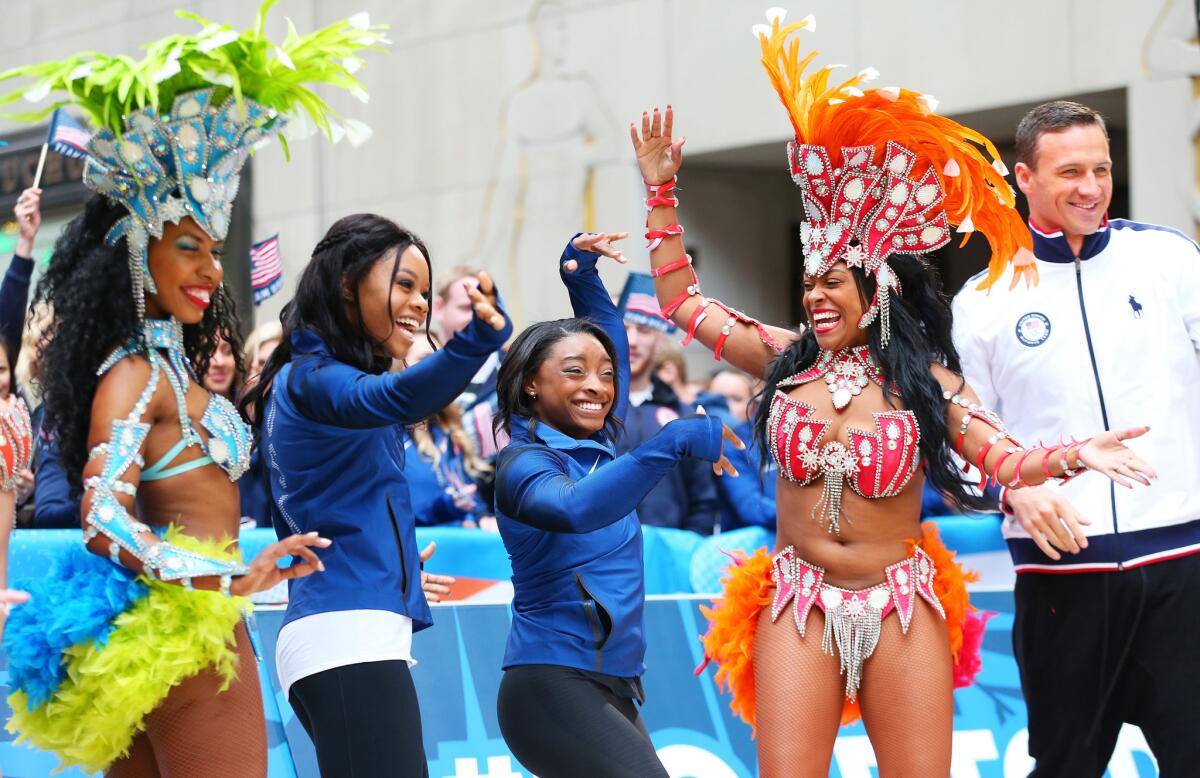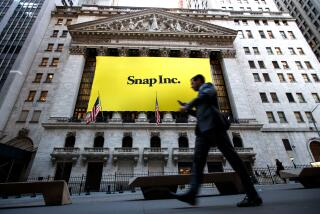Snapchat to feature 2016 Olympics highlights

- Share via
Since 1988, television giant NBC has fiercely guarded its valuable trove of Summer Olympics footage.
That worked well for decades, as viewers could be counted on to tune in regularly to television broadcasts of the games. But a dramatic shift in the way people — particularly younger consumers — seek entertainment has led the broadcast network to reach an unprecedented deal with Snapchat, with the two companies announcing Friday that the social media app would be allowed to feature videos of this summer’s Olympics.
The Venice app maker is the first service to ever reach a deal with NBC for shared rights to the games. The deal will see the two companies split revenue from ads running alongside Snapchat’s Olympics videos, although the companies were tight-lipped about the specific content Snapchat would be given. Snapchat isn’t paying an upfront rights fee.
Other social media companies could be next. NBCUniversal said it’s working on similar deals with Facebook Inc. and Twitter Inc. The sweeping efforts reflect the TV network’s desire to ensure that people younger than 35 tune into or stream the two-week sporting event, being held this August in Rio de Janeiro.
Young adults and teenagers increasingly say they follow current events from smartphone apps and websites — not television, where the Olympics have historically lived.
Overall prime-time TV viewing among people 18 to 34 has declined by 24% since 2012, the year of the Summer Games in London. NBC turned a profit on the 17-day spectacle, generating more than $1.3 billion in ad revenue and attracting 219 million viewers on its broadcast and cable networks.
Viewing among teens rose 25% compared with NBC’s broadcast network coverage of the Summer Games in Beijing in 2008. Among children ages 2 to 11, viewership jumped 31%. But the NBC telecasts were up only 1% among the coveted 18-to-34 demographic. The Snapchat deal targets that group, trying to get them excited about launching NBC on TV or online.
Snapchat says 60% of 13- to 34-year-olds with smart phones in the U.S. use its chatting and video-sharing app.
“We are thrilled to be working closely with Snapchat on extending the stories and excitement of the Rio Olympics to their large, dynamic, and socially active audience,” NBC Olympics President Gary Zenkel said in a statement.
Olympics-related footage and logos are expected to fit in two places on Snapchat.
The company may splice some of it into a Live Story compilation video that mostly will include videos shot by athletes and fans. Individual clips are available only on the app for 24 hours.
BuzzFeed and NBC also will select some highlights to place in a special section in Snapchat’s Discover feature, which promotes articles and videos from about 20 media companies. NBCUniversal is an investor in BuzzFeed.
Both the Live Story and Discover channel will be available in the U.S. only.
The sports and entertainment industries are crucial partners for social media apps because they put on live events that are widely watched on TV. Advertisers spend heavily to get on the broadcasts.
The Olympics are expected to boost overall spending on U.S. television ads by $703 million in 2016, or about 10% more than the games did in 2012, according to ad research firm Magna Global. The firm attributed the increase to the addition of two sports (golf and rugby) to the games this year. Rio de Janeiro being only four hours ahead of Los Angeles time also has advertisers enthusiastic about viewership potential.
NBC already has topped $1 billion in ad sales for this year’s Olympics, a mark it passed only just before the opening ceremony in 2012. The rights to broadcast from Rio de Janeiro cost NBC an estimated $1.2 billion.
Social media companies — recognizing that ads tied to live events can fetch higher prices —have tried to get a chunk of the TV money by arguing that viewers are multitasking on apps during the events.
Many of the apps encourage so-called second-screen behavior from users. Facebook and Twitter recently introduced features to better surface the best commentary about sports so fans can get sucked in during games.
But access to video, especially highlights, is a game-changer for sports fans.
That’s why Snapchat, depending on how much more content it ends up getting over rival services, could benefit greatly from the NBC deal.
“The sports side of the house is incredibly strong across these social platforms because it allows fans — casual or avid — to have a full experience around sporting events,” said Mary Scott, president of sports and brand experience at marketing firm United Entertainment Group. “They crave the behind-the-scenes information and direct engagement with players and other fans.”
A Facebook spokeswoman and Twitter spokesman separately declined to comment, but both companies are working to add to their roster of entertainment partners. Twitter recently agreed to pay the National Football League $10 million to stream 10 Thursday night games later this year.
NBC’s previous deals with Twitter and Facebook did not involve any revenue, nor did they include use of highlights.
Many top Olympics sponsors have advertised on Snapchat before, including General Electric, McDonald’s, Nike and Samsung.
Magna Global hasn’t predicted digital ad spending related to the 2016 Olympics, but it could be more than 30% higher than in 2012, said Michael Leszega, the firm’s senior associate for forecasting.
Although Snapchat, Facebook and Twitter were popular during the last Summer Olympics, their respective platforms have grown hugely in the last four years. Snapchat has grown an estimated 1,900%, to at least 200 million monthly users worldwide, since the 2012 games; Facebook 65% to 1.65 billion monthly users; and Twitter 86% to 310 million monthly users.








